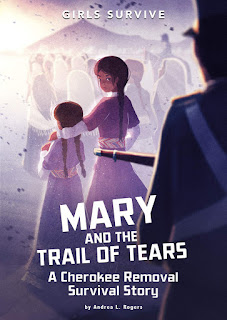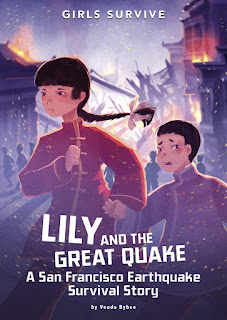These are still coming out in fours and still coming out earlier than expected. They weren't due until February 1st, yet they all came today. (ETA: I started writing this post back in January and got sidetracked from it for an embarrassingly long time.)
As always, I'm going in chronological order with these, so we're starting in May 1838. This book takes place over the course of ten months of terrible things. Reading anything involving the Native American genocide is always painful for me. I'm not Native American a bit, but it was absolutely horrific what was done to the US's indigenous peoples. One of the worst things to ever take place in this country and it's not talked about enough.
Mary and her family are living in Georgia. Her family is quite large. One cabin has her parents, her older sister Margaret, her younger sister Becky, and herself. A second cabin is for her maternal grandparents and a third has her oldest sister Nelly and Nelly's husband Raven. And their unborn baby.
So the family is doing normal daily life things when suddenly Grandma has a heart attack. She ends up dying overnight and everyone is preparing for the funeral when the house is approached by a bunch of white men. Things escalate quickly from here. Everyone is forced outside. The women gather as many possessions as they can, but also watch as their livestock and other possessions are claimed by the white men. Mary's father has gone elsewhere to build Grandma's coffin, so he's not present for almost the entire book. Grandpa goes along for a bit, then runs back into his home to be with his wife, who won't be buried properly now. And he ends up getting shot. Two people who won't be buried properly.
The family is herded to one of the internment camps by a fort. They're here through June, then off to another camp in Tennessee. They're there until almost November, then finally start heading west. Well, most of them do. Nelly goes into labor right before they're supposed to leave, so she, Raven and her mother stay behind while Margaret takes Mary and Becky on to Chattanooga. Thankfully, they reunite eleven days later.
Then the book time jumps to March, where they're in Missouri, then Arkansas. Nelly loses her baby to illness. Thankfully, the book ends on a slightly happier note as Mary's father is finally found.
Agh, this book should have been a least three times as long as it was. I thought it was quite well-written, but went way too quickly and none of the characters were very well-developed, because you just saw them reacting to tragedy after tragedy with occasional scenes of strength and determination. That's the trouble with cramming an important story into 103 pages. It didn't need that many to convey its sadness though. It was good, but as I said, definitely hard to read.
One thing this series does quite well is choose its authors. This was written by a Cherokee woman and you can tell.
Next up, the Oregon Trail where the main character is black. I honestly don't remember ever reading another historical fiction book with that set up. The author is the one who wrote Ann, Noelle and Charlotte's books.
And I basically described the whole book in the previous paragraph without even having read it yet. (I write these reviews in sections after finishing each book, not all at once after reading all four.) It's the same as other Oregon Trail stories only not nearly as detailed, due to the page constraints, and with bonus racism,
It's pretty good though for what it is, which is too short. Length is the main thing that would improve this series a lot. They're good books with good authors, but they feel rushed and leaving you wanting more.
Sarah and her family live in Iowa where they're free. Her father decides he wants to head west, alongside a neighbor and his son. So Sarah, her older brother James, and their parents all go on the Oregon Trail, leaving the paternal grandparents behind. From there on out, it's your basic Oregon Trail story with a couple added moments here and there. Of course, there are some people in their travel group who are racist dicks. There's a cool scene where Sarah's father sticks up for the Native Americans, as does an older white woman. And another where Sarah's father puts himself in front of the biggest racist asshole's gun to protect some innocent Native Americans who actually just want to help them across a river. Basically, Sarah's dad is a badass. He was my favorite. Sarah herself is fun, too. Her mom's on the feminist side, so she's been raised on "women can do anything men can do," and when her friend is lost, she takes it upon herself to join the search and she's the one who actually finds her.
My biggest issue with the book, aside from the length, is that it feels like the author had a checklist she was going down. And there's a reason for that. She pretty much says the same thing in the afterword. She says she wanted to show the trip from the perspective of a black girl. Check. She wanted to show it was difficult. Check. And she wanted to show it was tragic for Native Americans. Er...half a check? She gives more useful information about that in the afterword than she does in the text itself, where there's only that one conversation plus the gun incident. I'd also add that she wanted to show Sarah doing something men couldn't accomplish. Check.
Really, it's a fun read. I just get nitpicky when I write these reviews.
And sadly, it was a bit disappointing. I like Lily and her family a lot, but the story was all about the two kids making their way to the ferry to Oakland and it took up most of the book. Most of the book for just a few hours and then most of it wasn't interesting. Devastation. Broken things. Racism. Nothing new.
Unlike some of the others though, this one has a happy ending. The kids find their parents on the other side. Both the older man and young woman with bound feet who accompanied the kids also make it through the story alive. So that's good anyway.
I wanted this one to dig deeper, but it just didn't.
This book came out in January, but it's the one I recommend most. Who knew that we'd be facing a pandemic at the time? There were hints, but none of us really had any idea what we'd be facing.
Daisy is a German-American, so she's facing prejudice based on the war, as well as the onset of the Spanish flu.
I'm not going to spoil what happens, but this one was extremely well-written and is certainly relevant to today's times.





No comments:
Post a Comment